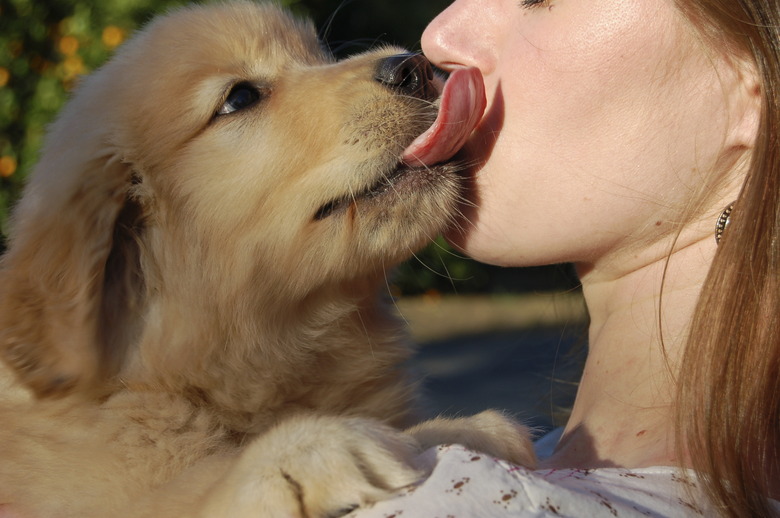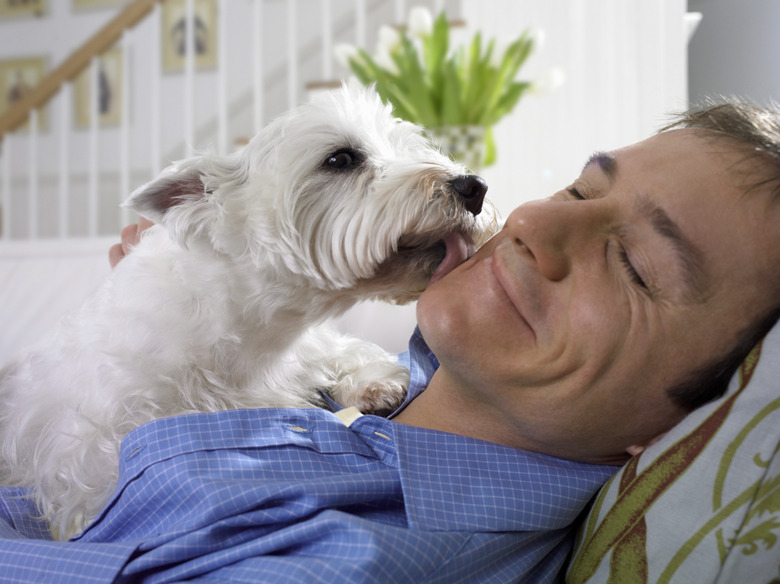Why Do Dogs Lick Human Wounds?
A dog licking wounds on humans may seem endearing, and he may do so to provide comfort or due to natural instinct. However, it could ultimately result in a risk of infection. While research shows that there are some benefits to dog saliva, it's no replacement for modern medicine. You should never allow your dog to lick your wounds.
Dog licking wounds on humans to comfort
Dog licking wounds on humans to comfort
When a dog injures herself, she is likely in some amount of pain. The act of licking releases a hit of serotonin in her brain and helps her feel better. When a dog licks you, she might be trying to take care of you in the same way that she would take care of herself. Dogs mean well when they try to lick your wounds, but it's best to put distance between your injury and your dog's tongue.
Dogs lick because of instincts
Dogs lick because of instincts
Licking seems to be something dogs do instinctively. Mothers will lick their young puppies, and dogs will lick themselves when they don't feel well. Dogs might lick you to clean you the same way they would clean themselves. In fact, dog saliva does have some properties that can help clean their wounds, and scientific research has found that human saliva heals wounds quicker.
By licking their own wounds, dogs can dislodge debris from them, but excessive licking can do more harm than good. It can lead to irritation, hot spots, and damaged skin, and it can dissolve stitches and reopen wounds. Plus, excessive licking can be caused by anxiety and stress and can become obsessive-compulsive. That's why you'll often see injured dogs sporting Elizabethan collars.
Pack mentality leads to licking
Pack mentality leads to licking
You are a member of your dog's pack. Wolves in the wild will run in packs, and dogs need to belong to their own pack as well, which is typically their human family. Any dog owner can tell you about a time their canine companion licked them or another furry member of the pack, even if the licks were unwanted. Dogs aren't the only animals to lick their own wounds and their people — feline friends do the same.
Though you may think your dog's licking is a sign of being at the top of the pack, it might actually be the opposite. Licking could be a sign of submission, as dogs will lick more dominant members of the pack. Wild dog packs will lick members to welcome them home, and your dog may be licking you to show affection. It's also possible that dogs feel comfort and security when they lick people.
Scientists are investigating dog saliva
Scientists are investigating dog saliva
Prior to modern medicine, people believed that dog licks could heal wounds, and this was even used by doctors in ancient Egypt. Scientists today are investigating canine saliva to see what kind of properties it has. One study has shown that canine saliva has antimicrobial enzymes and antimicrobial peptides, which aid in defending against infection. Dog saliva also kills E. Coli and Streptococcus canis.
However, just because there's some positives to dog saliva doesn't mean that you should let your dog lick you. We have medical care that far surpasses any potential benefits dog saliva possesses.
Dogs shouldn't lick human wounds
Dogs shouldn't lick human wounds
Dog licks, like dog bites, carry the risk of infection. There have been documented cases of dog saliva causing a bacterium capnocytophaga canimorsus infection. In 2016, a 70-year-old woman had a seizure, sepsis, and health problems that were likely caused by licks from her Italian greyhound. She recovered after two weeks of treatment. In 2018, a man had his legs and hands amputated after likely getting the same infection from a dog lick.
This bacteria, capnocytophaga, is found naturally in people, dogs, and cats, and most people don't get sick with this infection or another illness from coming in contact with a dog. So, don't be afraid to let your dog show her love by licking you — just don't let her lick your open wounds.
References
- PubMed: Lick of Death: Capnocytophaga Canimorsus is an Important Cause of Sepsis in the Elderly
- CBS News: Man's Legs Amputated After Dog's Licks Lead to Infection, Family Says
- Centers for Disease Control and Prevention: Capnocytophaga
- Wiley Analytical Science: The Saliva Proteome of Dogs: Variations Within and Between Breeds and Between Species
- Massive Science: Should You Let Your Dog Lick Your Face?
- American Kennel Club: Why Is My Dog Licking Me?


